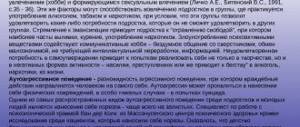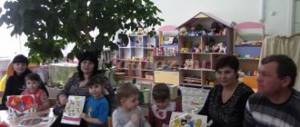Abstract: "The role of the family in the prevention and prevention of delinquency among minors."
It is in the family that the first habits and norms of behavior arise. What a child acquires in the family during childhood, he retains throughout his entire subsequent life. The importance of the family as an educational institution is due to the fact that the child stays in it for a significant part of his life, and in terms of the duration of its impact on the individual, none of the educational institutions can compare with the family. It lays the foundations of the child’s personality, and by the time he enters school, he is already more than half formed as a person. The family can act as both a positive and negative factor in education. Life and science have proven that all the troubles in children, and then in adults, are explained by mistakes in family upbringing. The most important thing for a child is to be loved for who he is. The outstanding teacher V.A. Sukhomlinsky said: “Where there is no wisdom of parental education, the love of a mother and father for children disfigures them.” Let us name the most significant defects in interpersonal relationships that a child encounters in the family.
- Unfavorable conditions of family education.
- Antisocial behavior of parents.
- Insufficient attention and love from parents.
- Overprotection.
- Over-satisfying the child's needs.
- Excessive demands and authoritarianism of parents.
“This can happen to someone else, but not to me and my child,” say most parents. But delinquency and crime are not only committed by children from disadvantaged families.
So what should parents do if they find out that their child is at risk?
The real opportunity to help a child is to follow the “road of fourteen steps.”
- Step 1. Remain calm and dignified: shouting and threats will not achieve anything.
- Understand the situation. Do not draw categorical conclusions.
- Maintain your child's trust in you.
- Talk to him as equals. It is quite possible that the child behaves defiantly in order to assert himself and survive the drama of life.
- Find out as much as you can about what is happening to your child. Do not believe him completely - the truth lies in the attitude towards the child, recognizing that he is already an adult and can be responsible for his actions.
- Don't let yourself be manipulated.
- Do not correct your child’s mistakes.
- Talk less, do more.
- Try to restore mutual understanding with your child.
- Give your child the opportunity to correct their behavior on their own
- Don't let the process take its course
- Restore trust in your child
- Help your child change their life for the better.
- Set reasonable control boundaries.
Some tips for preventing delinquency and crime:
- Try to spend more time with your child, take an interest in his successes and failures;
- Try to help your child solve problems;
- Explain to your child the rules of behavior at school, at home, on the street, at a party, in public places;
- Be interested in who and where your child spends time;
- Enroll your child in a sports section or club, occupy his free time;
- Do not hesitate to seek help from the school or specialists from other institutions and organizations.
Of course, it can be difficult for parents alone to cope with the problem, but the joint efforts of the family, school and specialists will definitely give results, and the road, as they say, will be mastered by those who walk,
Parents' meeting "The role of the family in the prevention of delinquency among minors"
Parents' meeting “The role of the family in the prevention of delinquency among minors” Goal: to increase the knowledge of parents on the topic: “The role of the family in the prevention of delinquency among minors” Objectives: - promotion of legal knowledge among parents; -propaganda of juvenile delinquency; — developing skills for critical analysis of complex situations; - developing the ability of parents to work in a group, express their views, and lead a discussion. Equipment: Daisies, multimedia presentation, video clip, instructions for parents. Form of holding: round table Proceedings of the meeting Good afternoon, dear participants of our event! Today we have gathered to talk about one important issue - the prevention of crimes committed by teenagers and their consequences. Our children are growing up... From small, helpless children they are turning into teenagers. As children grow, the problems we face become more serious. How to protect your child from smoking, alcohol, drugs, and crime? We may not find a unique recipe today, but we’ll try to figure it out. Task1 You have daisies on your tables. Write on the petals what knowledge and actions parents need to prevent their child from committing crimes. (interests, circle of friends, control over studies, relationship with subject teachers, etc.) Speech by parents. Daisies are hung on the board. Our flowers were left without support; such a flower would not survive in nature. He needs support. And the legal knowledge of the parents will serve as a support. (We attach the stem and leaves with the words offense, crimes, misdemeanors to the daisies) Work on the slides (The social teacher introduces the concepts) A law is a normative act (document) adopted by the highest body of state power in the manner prescribed by the Constitution. Crime is an antisocial act that causes harm to society, is prohibited by law and entails punishment. Crimes are socially dangerous criminal acts prohibited by criminal law that harm public relations and the established legal order in society. For crimes, the most stringent measures of state coercion are applied - criminal legal sanctions that establish significant levels of responsibility for the persons guilty of committing them. Misdemeanors are guilty illegal acts that are characterized by a lower degree of public danger compared to crimes and which entail the application not of criminal sanctions, but of administrative, disciplinary or civil measures. There are types of legal liability for violations: 1. Criminal liability - liability for violation of laws provided for by the Criminal Code. (murder, robbery, rape, insults, petty theft, hooliganism). For malicious hooliganism, theft, and rape, criminal liability begins at the age of 14. 2. Administrative liability is applied for violations provided for by the Code of Administrative Offenses. Administrative violations include: violation of traffic rules, violation of fire safety. People can be held accountable for administrative offenses from the age of 16. Punishment: fine, warning, educational measures. 3. Disciplinary liability is a violation of labor duties, i.e. violation of labor laws, for example: absenteeism without a good reason. Now let's think, will every child tell their parents about what happened? Of course not. It all depends on the family, on the trust of children in their parents. The word "family" comes from the word "seed". A small seed, lovingly planted in the ground, produces a strong sprout. Over time, first delicate flowers appear on it, then good fruits. The main concern of parents is that their children grow up to be good people. Family happiness is achieved through the love and patience of parents, and prosperity and well-being are achieved through constant work. Exercise “Blank Slate”. (The social educator takes a blank sheet of paper, tearing off pieces during analysis): Let’s imagine that this is the soul of a child. When a child is not noticed in the family, part of his soul is torn off (let’s tear off part of the paper). When a child is not accepted by his peers, the same thing happens. When a child is not understood by teachers, another piece of his soul is lost! When he stops believing in himself - ........ When no one needs him, ... what happens to his soul? What's the end result? (A suggestive hole should appear in the sheet of paper) The child’s soul becomes a solid black hole…. experiencing a feeling of collapse, hopelessness, despair. — First of all, the family has a great influence on the formation of a child’s personality. It is in the family that the first habits and norms of behavior arise. What a child acquires in the family during childhood, he retains throughout his entire subsequent life. The importance of the family as an educational institution is due to the fact that the child stays in it for a significant part of his life, and in terms of the duration of its impact on the individual, none of the educational institutions can compare with the family. It lays the foundations of the child’s personality, and by the time he enters school, he is already more than half formed as a person. The family can act as both a positive and negative factor in education. The positive impact on the child’s personality is that no one, except the people closest to him in the family - mother, father, grandmother, grandfather, brother, sister, treats the child better, loves him and cares so much about him. And at the same time, another social institution cannot potentially cause as much harm in raising children as a family can do. Life and science have proven that all the troubles in children, and then in adults, are explained by the mistakes of family upbringing, the main one of which is the lack of love and the inability to praise and support their children. The most important thing for a child is to be loved for who he is. The outstanding teacher V.A. Sukhomlinsky said: “Where there is no wisdom of parental education, the love of a mother and father for children disfigures them.” Listen to the parable A traveler walking along the river heard the desperate cries of children. Running to the shore, he saw drowning children in the river and rushed to save them. Noticing a man passing by, he called him for help. He began to help those who were still afloat. Seeing the third traveler, they called him for help, but he, not paying attention to the calls, quickened his steps. “Are you indifferent to the fate of your children?” - the rescuers asked. The third traveler answered them: “I see that you two are coping so far. I’ll run to the bend, find out why children fall into the river, and try to prevent it.” What is the meaning of the parable? This parable illustrates approaches to the solution. You can save “drowning” children - build hospitals, fight drug dealers. The task of teachers and parents is “to bring the river to the turn and prevent the children from falling into the water.” those. engage in crime prevention. Drawing up an algorithm (Work in groups.) In order to prevent the negative consequences of deviations in time, as well as to correct behavior, it is necessary to develop some algorithm of actions that will help us in the future in raising our children: - Study your child’s circle of friends - Take an interest in the child’s problems , his academic performance and discipline at school and public places - Plan a joint vacation with children - Study literature on pedagogy and psychology, apply basic methods of psychological and pedagogical influence - Correct the child’s behavior in a timely manner - Contact specialists Watch a video clip Happy family. Memo for parents • The child is praised - he learns to be noble • The child grows up in security - he learns to believe in people • The child lives in understanding and friendliness - he learns to find love in this world • The child is supported - he learns to value himself • The child is constantly criticized - he learns to hate • The child grows up in reproaches - he learns to live with a sense of guilt • The child is ridiculed - he becomes withdrawn • The child lives in enmity - he learns to be aggressive


